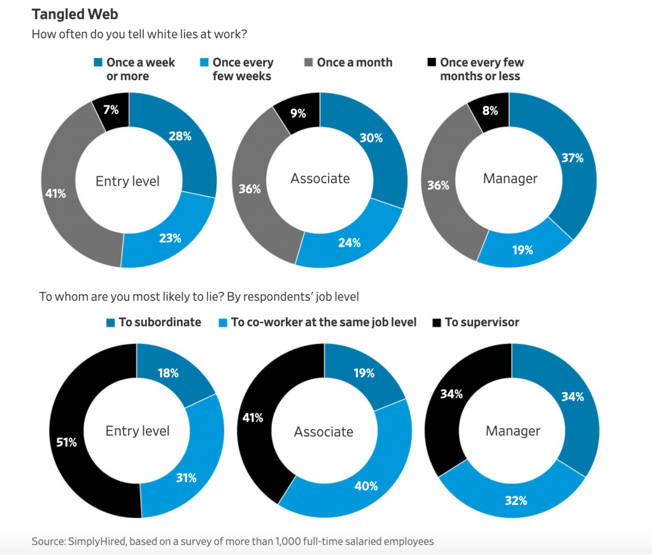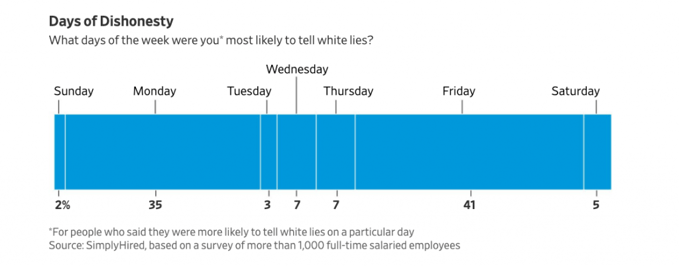Let’s talk honestly about honesty. I’ve been thinking about it a lot recently.
Last Friday, during my final perusal of Balloon’s many Slack channels before signing off for the evening, I noticed a new message from one of my teammates, Angela. She’d shared Tessa West’s piece “The Lies We Tell at Work—and the Damage They Do,” published under the Wall Street Journal’s Journal Reports: Leadership vertical.
Apparently, I’m not the only one who’s been feeling a nagging insecurity about truth these days.
The article reports some staggering statistics of how often people tell lies in the workplace. It also explains how the habit of lying is infectious and overpowering: the New York University psychology professor writes that “It doesn’t take long for a habit to become a norm, and a norm to become a culture.”

Of course, we all tell little lies. We tell lies of omission, of exaggeration, of misjudgment (an example of the latter: I told my husband and my team that I was signing off for the evening a few hours ago, but after reading West’s piece, I was too energized not to sit down and distill my thoughts. So here I am, late into the night, still working).
We tell lies to each other and ourselves. Sometimes we tell lies to survive.
Apparently, we even tell lies to start and end our work week.

Most of the time, they’re not purposefully malicious. So what’s the harm?
In her opening statements, West gives it to us straight: “Dishonesty can kill healthy team dynamics, encourage manipulation and deception, and keep honest people from getting ahead.”
The piece stratifies professional lies from their earliest occurrence (on the resume), through the duration of an individual’s tenure at a company (where they may lie to get ahead, get out of trouble, or get credit for someone else’s ideas), to the last opportunity for truth…or more lies (in the exit interview).
For me, though, perhaps the most poignant category of workplace falsities was “Lying with feedback.” In my opinion, this is where lies of any sort can get particularly insidious.
In an ideal world, everyone involved in a feedback meeting would give honest, constructive criticism. Everyone would have an equal opportunity to share their thoughts and feelings. Everyone’s comments would be evaluated by merit. And everyone would take the most valuable pieces of feedback and get it done.
Honesty is quite literally vital.
Of course, we’re not living in an ideal world. Painfully far from it. West points out that, “harsh truths violate social norms, and so people avoid telling them. And a too-nice culture can create problems, because it creates an environment where people who need to improve have no idea how. We also know that cognitive biases, often based on social or professional status, gender, or race, can warp how people evaluate ideas. Twenty to forty percent of the population are introverts and less likely to share in a group setting, but the loudest voice in the room is not always the most informed or thoughtful.
In this moment of collective uncertainty and anxiety, lying at work is more harmful than ever. We’re in the midst of a devastating global health crisis, and no industry is totally insulated from the turbulence of its wake. If companies don’t adapt and, in many cases, pivot their business strategies, they’ll be at risk of folding and leaving their employees without income.
Honesty is quite literally vital.
What’s more, this widespread transition to a work-from-home culture has broadened some of the avenues to dishonesty. We can’t share physical spaces with our coworkers, so the virtual and mental spaces we share have to make up the difference in accountability and alignment.
If any company plans to weather this storm, its leadership must recognize that no individual can answer all the Big Questions alone. Leaders need to trust their employees to offer valid insights, and employees need to trust their leaders to evaluate their thoughts fairly.
So how do we solve these problems? Well, West gives us one idea:
"Providing anonymity, at least initially, can help build trust."
— Tessa West, NYU psychology professor
Enter Balloon.
Our platform allows companies to launch flights, or groups of open-ended questions posed to solve a specific problem, and invite their teams to submit balloons, or anonymous responses. After everyone has a chance to respond and discuss, anyone on the flight can pump, or support, others’ balloons based on merit. Finally, the most-supported balloons float to the top, and their authors can choose to claim credit or not.
Additionally, during the first stage of the flight, individuals can leave anonymous comments on balloons to ask for an explanation, leave a suggestion, or virtually nod in agreement. This way, we maintain the best part of brainstorming meetings—collaboration—and cut out the worst parts—cognitive biases, damaging group dynamics, fears, and, of course, lies.
When I read how prolific dishonesty is in the office (and with our offices now online), it was clear that the digital tools we use are more influential than ever.
At Balloon, we like to say we’re guided by “true.” To us, “true” is accurate, precise, and honest. The future feels more unclear than ever, but one thing is certain: people are craving truth.
True insights, true connections, true solutions.
